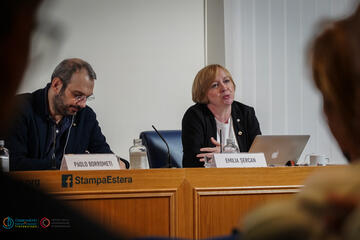
Emilia Șercan © Paolo Martino, OBCT
The Media Freedom Rapid Response (MFRR) welcomes the September 5 ruling reopening the investigation into the crimes against journalist Emilia Șercan. This is a positive step towards addressing the harassment and intimidation she has faced for the last two years.
This ruling comes after a long legal battle by Șercan to hold accountable those responsible for smear campaigns against her and leaking her private photos, following her reports on high-profile cases of plagiarism, including the President of the Romanian Senate, and former Prime Minister, Nicolae Ciucă.
The initial investigation produced a litany of errors, unnecessary delays, and breaches of procedure before it was closed without a prosecution in November 2023. These failures led to numerous protests from journalists and media freedom groups concerned that the case may have succumbed to a cover-up. Last Thursday, Șercan won her appeal, which will lead to the relaunch of the investigation in the next few weeks.
In April, the Romanian Supreme Court reopened another file related to this case, in which former Interior Minister Lucian Bode was under investigation, confirming also in that file the faulty prosecution and a failure of prosecution.
This decision to acknowledge the failure of the earlier investigation represents a crucial victory for independent journalism in Romania. We commend the Court for taking this action and urge authorities to conduct a thorough and impartial investigation. The MFRR continues to call for more robust protections for investigative journalists like Șercan, who are likely to face retaliation for their work.
Signed
International Press Institute (IPI)
European Federation of Journalists (EFJ)
Free Press Unlimited (FPU)
OBC Transeuropa (OBCT)
Tags: Romania Safety of journalists smear campaign Media freedom
This content is part of the Media Freedom Rapid Response (MFRR), a Europe-wide mechanism which tracks, monitors and responds to violations of press and media freedom in EU Member States and Candidate Countries. The project is co-funded by the European Commission.


